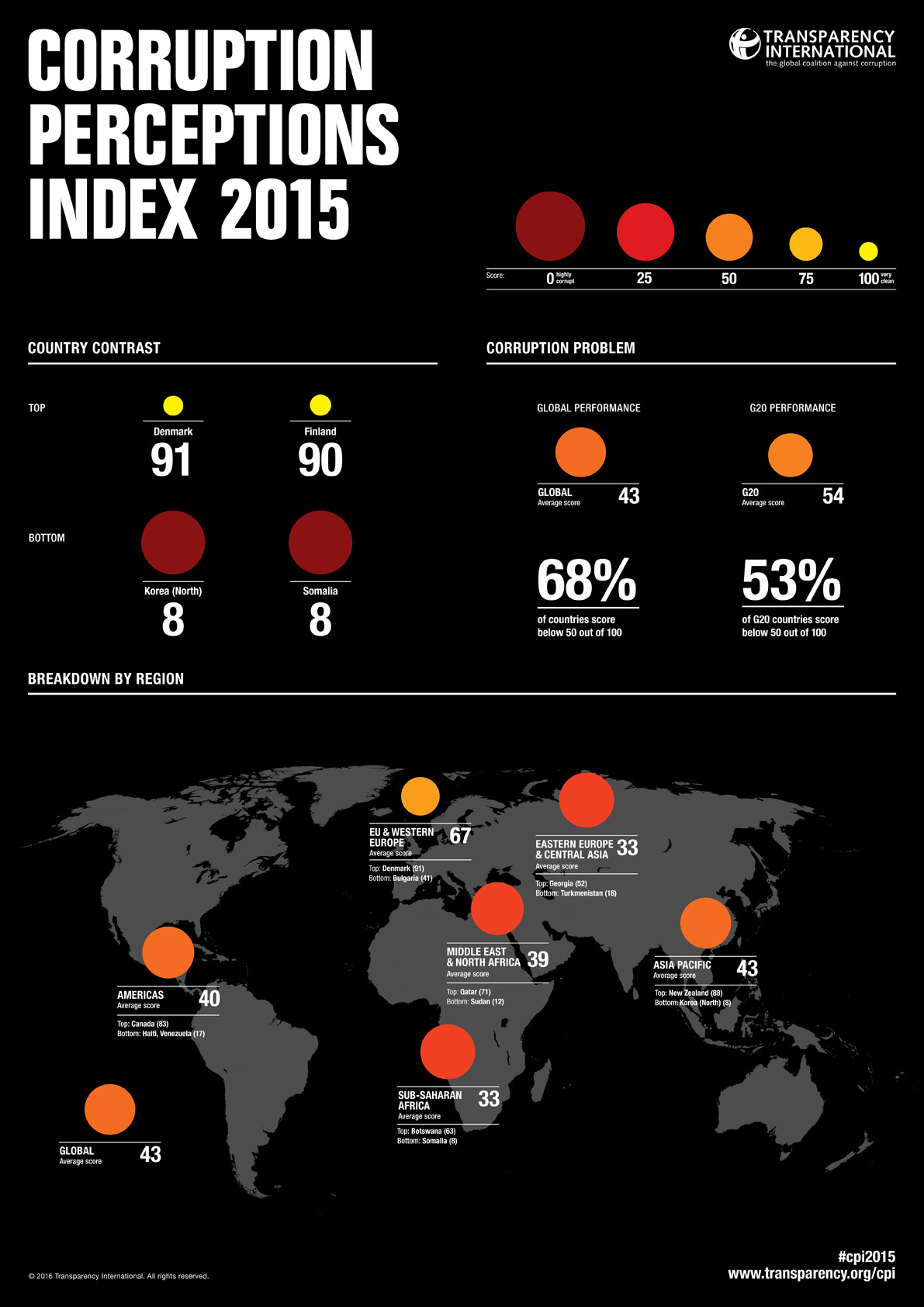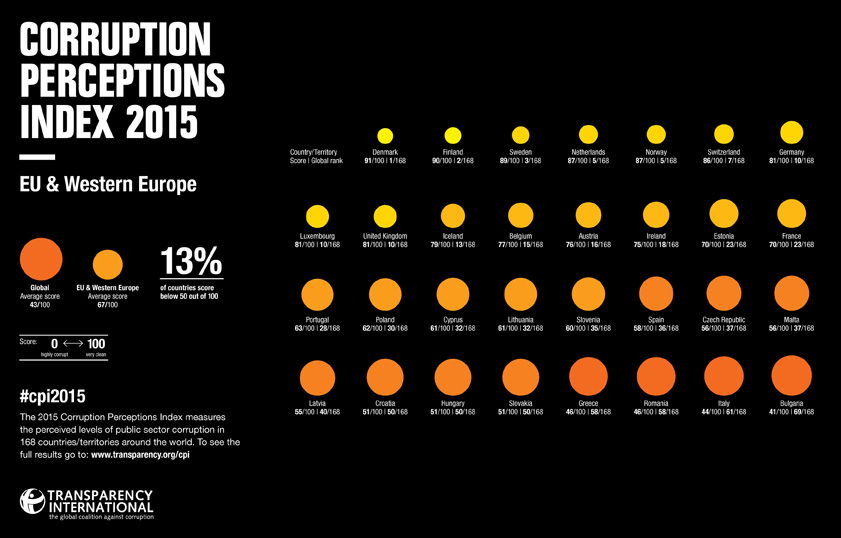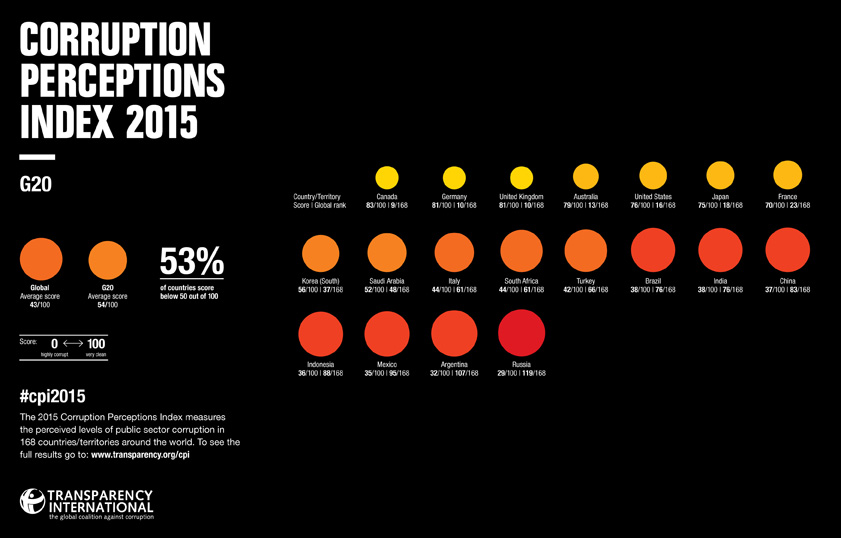Not-one single country anywhere in the world is corruption free. Italy is still very far from its goals in the rank of corruption. That’s what Transparency International said in its report, the Corruption Perceptions Index (CPI ) that analyses the situation in 168 countries . Italy is ranked 61 with a score of 44 points on a scale from 0 (highly corrupt ) to 100 (very clean), same score of Lesotho, Senegal, Montenegro and South Africa. While Italy is the penultimate in EU countries rank. Denmark, Sweden and Finland are the less corrupted. Compared to last year’s global rank our country gained a point in the score, from 43 to 44, and eight positions in the rank from 69 to 61.
Corruption in public and political sectors
It seems possible to see some little and weak steps toward an anticorruption fight, but regarding Italy in EU rank it is still on the bottom of the rank, followed only by Bulgaria, and it is still behind countries usually known to be highly corrupt like Greece and Romania, both ranked 58 with 46 points. “We are pleased to verify that finally there is about turn in the trend , even if very small, comparing with the past, that represents a hope for the coming years” Virginio Carnevali president of Transparency International Italy says “As the news confirm the walk is still long , but with persistence it is possible to reach goals . In these days the Italian Chamber approved the laws on whistle blowing, public administrations are day by day becoming more transparent and open, a proposal of regulation arrived to Montecitorio”.

No country in the rank obtained the maximum score of 100, because at the moment no one single country anywhere in the world is corruption free: over 6 billion of people live in a country with a serious problem of corruption. The Northern countries with on the top Denmark, with a score of 91 points, followed by Sweden and Finland are the less corrupted. While Somalia and North Korea are at the bottom of the rank. Brazil under the scandal of Petrobas, had a fall of 5 points , from 69 position to 76.

In 2015 in the Americas there have been two different trends: uncovering of grand corruption networks and the mass mobilization of citizens against corruption. While in Europe, even if governments declare to be in favor of anticorruption laws, in reality they keep on strengthen the corruption. Very worrying is the marked deterioration in countries like Hungary, Macedonia, Spain and Turkey. Nowadays it is possible to see a corruption growth in Europe.
Northern countries are on the top of the rank but they are not very clean yet: in 2015 ,thirteen Danish public employees arrested in a corporate bribery case; the mayor of Bergen, Norway’s second largest city, charged with bribery; Sweden’s partly state-owned Telia Sonera amid huge bribery allegations in Uzbekistan; and the ongoing trial of the former head of Helsinki police’s antidrug squad, charged with running a drug cartel of his own. In Azerbaijan, Kazakhstan, Russia, Uzbekistan and others, governments are restricting, if not totally stifling, civil society and free media . While in Western Europe there are still bank scandals, in particular in 2015 the scandal of Deutsche Bank.

The sad conclusion by Transparency International is that there’s anti-corruption legislation on the books everywhere but a failure to implement and enforce is allowing the corrupt to operate with impunity.
@IreneGiuntella
It seems possible to see some little and weak steps toward an anticorruption fight, but regarding Italy in EU rank it is still on the bottom of the rank, followed only by Bulgaria, and it is still behind countries usually known to be highly corrupt like Greece and Romania, both ranked 58 with 46 points. “We are pleased to verify that finally there is about turn in the trend , even if very small, comparing with the past, that represents a hope for the coming years” Virginio Carnevali president of Transparency International Italy says “As the news confirm the walk is still long , but with persistence it is possible to reach goals . In these days the Italian Chamber approved the laws on whistle blowing, public administrations are day by day becoming more transparent and open, a proposal of regulation arrived to Montecitorio”.







